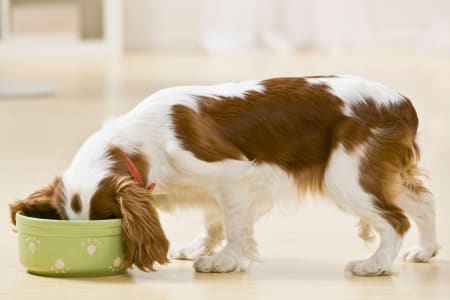What to Feed Dogs With Hypothyroidism
Your dog’s thyroid is a small gland located in the neck that produces hormones which help to regulate many essential functions in the body. If the thyroid isn’t able to produce enough of these hormones, it’s considered underactive, and serious health problems may arise. This condition is called hypothyroidism.
Breeds that are believed to be prone to hypothyroidism include the Beagle, Dalmatian, Havanese, Maltese, Pitbull and the Boxer.

Symptoms of Hypothyroidism
Here are some common symptoms that occur in dogs with hypothyroidism:
- Reduced activity
- Intolerance to cold
- Changes in appetite and/or weight
- Thinning fur
- Dull coat
- Behavioral challenges such as depression, aggression, anxiety, fear and irritability
- Excessive shedding
- Scaly skin
Although hypothyroidism is not life-threatening, it will require lifelong treatment with synthetic hormones such as levothyroxine.
Along with administering daily medications, you may also need to make changes to your dog’s diet and may want to consider providing glandular extract supplements.
For dogs with hypothyroidism, a high-quality diet full of wholesome, natural ingredients is essential to their health and well-being, as artificial additives and low-quality fillers in some foods can aggravate the condition.
Below, we’ve got some advice from our Waxhaw vets about the best dog food for hypothyroidism.
Which diet is best for dogs with hypothyroidism?
Your first priority when it comes to feeding your pup with hypothyroidism should be to provide a balanced diet. Here’s what that looks like:
Animal-Based Sources
Sources such as fish, poultry, and meat are your best bets as they support lean muscle mass. Animal-based fats such as salmon oil and chicken fat will give him some much-needed energy. Essential fatty acids also address coat and skin issues your dog may have developed as a result of the hypothyroidism.
A Balanced Diet
In addition to the above, you might not think dogs would eat fruits and vegetables but they can definitely use the carbohydrates and dietary fiber to support their digestive system.
Other nutrients such as iodine help the thyroid produce thyroid hormones. Also look for foods that contain natural sources of vitamin A, vitamin B, iron and folic acid, such as liver, to support thyroid function and blood health.
High-Quality Ingredients
As a rule of thumb, a short list of ingredients is a good thing. Wholesome, natural foods such as fats, animal proteins, fruits and vegetables are best.
Highly Digestible
Dogs naturally digest animal-based ingredients better, but supplements such as probiotics and prebiotic fibers can add that extra kick he needs to digest all of his food well.
No Artificial Additives
Artificial preservatives, flavors and colors that are in many commercial dog foods can negatively affect how your dog’s thyroid functions, so choose recipes with natural preserves (citric acid or mixed tocopherols), with no artificial flavors or colors.
Grain-Free
Though some dogs may be able to tolerate whole grains, many commercial dog foods use genetically modified ingredients in their grains that can affect the balance of your dog’s hormones. Choose a grain-free diet just to be safe.
Can a dog with hypothyroidism lose weight?
Following an accurate diagnosis, your dog may lose weight as a result of undergoing treatment (usually with medications) for hypothyroidism. Other potential side effects include an increase in energy, and improved hair and skin. If the condition is managed appropriately, senior dogs may have some more vitality.
Foods to Avoid When A Dog Has Hypothyroidism
We’ve discussed what types of foods to look for when it comes to feeding your dog with hypothyroidism. Equally important is what to avoid. There are a few universal truths about dogs: they should never eat chocolate, as it’s toxic.
Eggs should be cooked as if you were making them for yourself, and onions are out since they kill dogs’ red blood cells, resulting in death. Your vet may also recommend avoiding canned food and table scraps. As noted above, a natural diet is a must. Consult your veterinarian on which foods would be best for your dog.
How to Introduce the New Diet
Once you’ve chosen your dog’s new diet, gradually transition him onto it - don’t switch out the old diet all at once or you risk causing stomach upset.
Begin with a 25% mix of the new food and 75% of the old food for the first few days, gradually increasing the amount of new food provided your dog is tolerating the change well.
Note: The advice provided in this post is intended for informational purposes and does not constitute medical advice regarding pets. For an accurate diagnosis of your pet's condition, please make an appointment with your vet.
